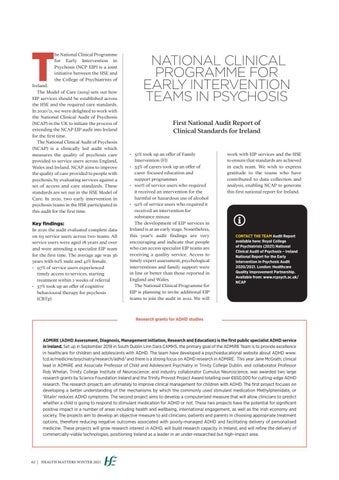T
he National Clinical Programme for Early Intervention in Psychosis (NCP EIP) is a joint initiative between the HSE and the College of Psychiatrists of
Ireland. The Model of Care (2019) sets out how EIP services should be established across the HSE and the required care standards. In 2020/21, we were delighted to work with the National Clinical Audit of Psychosis (NCAP) in the UK to initiate the process of extending the NCAP EIP audit into Ireland for the first time. The National Clinical Audit of Psychosis (NCAP) is a clinically led audit which measures the quality of psychosis care provided to service users across England, Wales and Ireland. NCAP aims to improve the quality of care provided to people with psychosis, by evaluating services against a set of access and care standards. These standards are set out in the HSE Model of Care. In 2020, two early intervention in psychosis teams in the HSE participated in this audit for the first time. Key findings: In 2020 the audit evaluated complete data on 63 service users across two teams. All service users were aged 18 years and over and were attending a specialist EIP team for the first time. The average age was 36 years with 62% male and 42% female. • 97% of service users experienced timely access to services, starting treatment within 2 weeks of referral • 57% took up an offer of cognitive behavioural therapy for psychosis (CBTp)
NATIONAL CLINICAL PROGRAMME FOR EARLY INTERVENTION TEAMS IN PSYCHOSIS First National Audit Report of Clinical Standards for Ireland • 51% took up an offer of Family Intervention (FI) • 55% of carers took up an offer of carer-focused education and support programmes • 100% of service users who required it received an intervention for the harmful or hazardous use of alcohol • 92% of service users who required it received an intervention for substance misuse The development of EIP services in Ireland is at an early stage. Nonetheless, this year’s audit findings are very encouraging and indicate that people who can access specialist EIP teams are receiving a quality service. Access to timely expert assessment, psychological interventions and family support were in line or better than those reported in England and Wales. The National Clinical Programme for EIP is planning to invite additional EIP teams to join the audit in 2022. We will
work with EIP services and the HSE to ensure that standards are achieved in each team. We wish to express gratitude to the teams who have contributed to data collection and analysis, enabling NCAP to generate this first national report for Ireland.
CONTACT THE TEAM Audit Report available here: Royal College of Psychiatrists (2021) National Clinical Audit of Psychosis – Ireland National Report for the Early Intervention in Psychosis Audit 2020/2021. London: Healthcare Quality Improvement Partnership. Available from: www.rcpsych.ac.uk/ NCAP
Research grants for ADHD studies
ADMiRE (ADHD Assessment, Diagnosis, Management initiation, Research and Education) is the first public specialist ADHD service in Ireland. Set up in September 2018 in South Dublin Linn Dara CAMHS, the primary goal of the ADMiRE Team is to provide excellence in healthcare for children and adolescents with ADHD. The team have developed a psychoeducational website about ADHD www. tcd.ie/medicine/psychiatry/research/adhd/ and there is a strong focus on ADHD research in ADMiRE. This year Jane McGrath, clinical lead in ADMiRE and Associate Professor of Child and Adolescent Psychiatry in Trinity College Dublin, and collaborator Professor Rob Whelan, Trinity College Institute of Neuroscience; and industry collaborator Cumulus Neuroscience, was awarded two large research grants by Science Foundation Ireland and the Trinity Provost Project Award totalling over €650,000 for cutting-edge ADHD research. The research projects aim ultimately to improve clinical management for children with ADHD. The first project focuses on developing a better understanding of the mechanisms by which the commonly used stimulant medication Methylphenidate, or ‘Ritalin’ reduces ADHD symptoms. The second project aims to develop a computerised measure that will allow clinicians to predict whether a child is going to respond to stimulant medication for ADHD or not. These two projects have the potential for significant positive impact in a number of areas including health and wellbeing, international engagement, as well as the Irish economy and society. The projects aim to develop an objective measure to aid clinicians, patients and parents in choosing appropriate treatment options, therefore reducing negative outcomes associated with poorly-managed ADHD and facilitating delivery of personalised medicine. These projects will grow research interest in ADHD, will build research capacity in Ireland, and will refine the delivery of commercially-viable technologies, positioning Ireland as a leader in an under-researched but high-impact area.
62 | HEALTH MATTERS WINTER 2021
















































